Fusing Faith with Food – Big Brother Biu’s Seafood Restaurant (2)
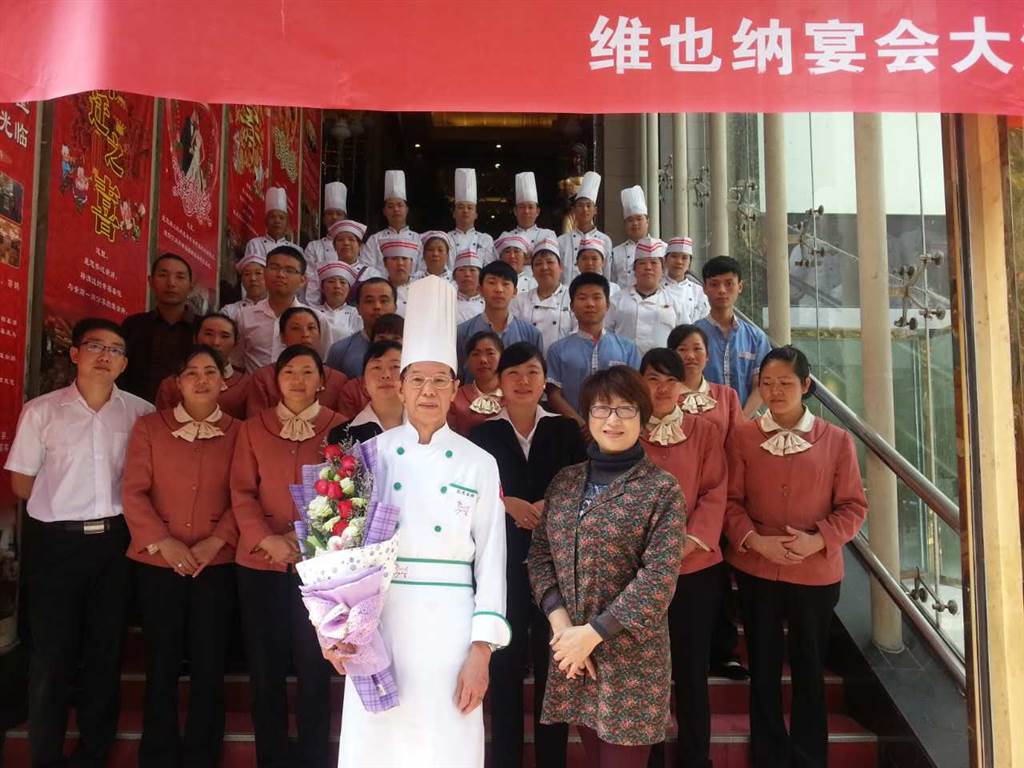
“This cleaver of yours,” Chef Tong Li began the cooking instruction with displeasure, “is not even good enough for cutting bean curd!”
James Li, Chef Tong Li’s son, said that his father was very demanding when it comes down to cooking. Chef Tong Li had yelled at him so much that one time he ran out of the kitchen, broke down and cried.
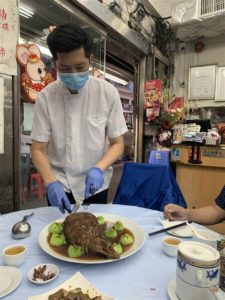
Photo: Big Brother Biu (James Li) Cuts the Duck.
I knew that Chef Tong Li’s comment to me was very mild as compared to his expectations on his son. I felt honored as he was willing to teach me some basic techniques in cooking. The session proceeded to Chef Tong Li’s demonstration on how to sharpen a cleaver.
“Place the cleave over the whetstone at 45 degrees,” Chef Tong Li placed the cleaver at an angle, “first sharpen this side by sliding ten times,” he then let me take over. “Good, then do the same on the other side for ten times too.” I took this task with care. “You must whet the exact number of times on both sides, otherwise the edge becomes uneven.”
This demonstration is a good glimpse into Chef Tong Li’s approach to cooking. He is keenly aware of the technical aspect of making food. He has often told me that he cooks with a scientific precision.
For every dish that Chef Tong Li makes, he works on a balance of six key principles. The first is the quality of the ingredients. Secondly, the ingredients must also match in the right proportions. The ingredients must be prepared in the right way before cooking. During the cooking, one must be very precise in the temperature and timing. Finally, the right use of salt enhances the natural flavors in the food.
The razor clam would illustrate what Chef Tong Li meant by precision. Back in the late 1980s, the razor clam was still unknown to the restaurants of Hong Kong. Chef Tong Li was the first to find foot-long razor clams in Scotland and introduced them to Hong Kong’s diners. After many experiments, he came up with the rule for steaming razor clam: at exactly 1 minutes and 45 seconds.
What Chef Tong Li has never made clear to me was his art of cooking. I have shadowed him in his teaching a few times over the years. The art of his cooking is something that is revealed, and then experienced, rather than taught.
Perhaps of all the dishes he has shown me, the five-spice duck was what gave me a glimpse of the art of Chef Tong Li’s cooking. There are some seven to eight steps in preparing the duck before it goes to the steamer. Each of these steps is technical. Chef Tong Li demonstrated these steps in detail, and he would explain why these steps were critical.
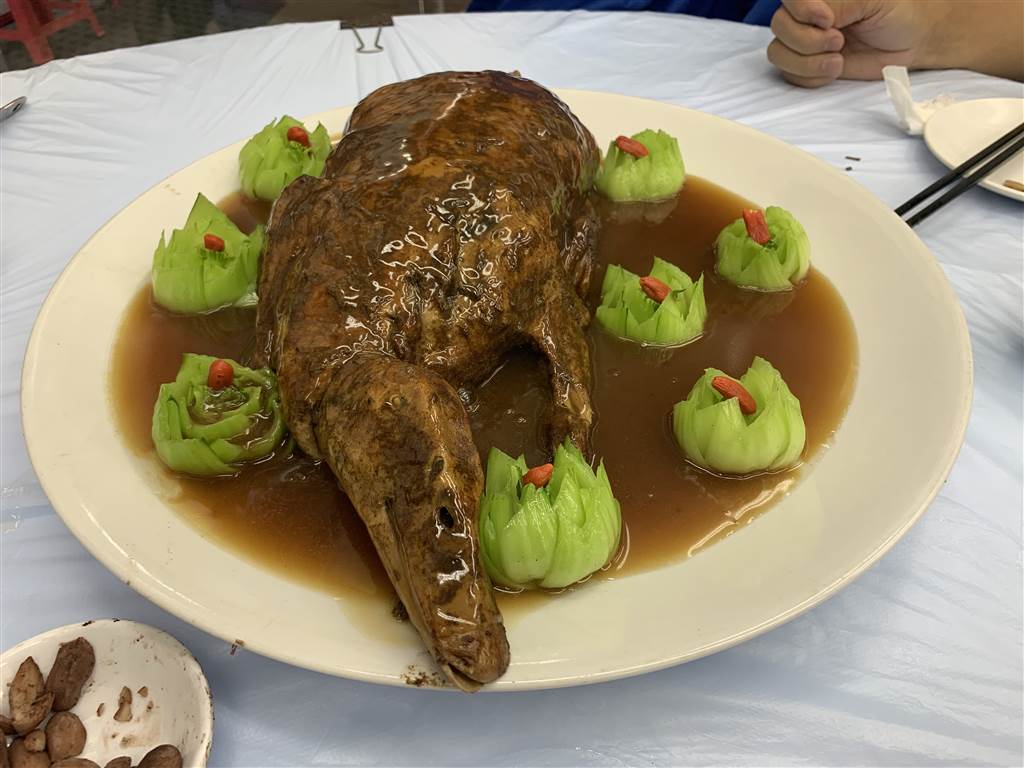
Photo: this is the Eight-Treasure Duck, which requires much more skills to prepare than the Five-spice Duck.
For example, in the stuffing there are all kinds of spices. The art is to know what these spices do, and prepare the duck accordingly. There are onions, shallots, and ginger in the stuffing. Chef Tong Li recommended that the ginger and the shallots be “walk on the oil” (wok-fried) before going into the stuffing, because that would enhance the aroma. Ducks have a natural gamey taste, and the aroma of a combination of spices will serve to dampen the gamey taste of ducks.
I have made the five-spice duck for over ten times by now. After so many attempts, I have slowly learned the art of making it. To give the duck the right color, and thus the right presentation, a critical step is to rub dark soy all over it. To coat the duck, I would have to fry it in quite a bit of oil, thus adding color. I learned that after rubbing the dark soy and before it goes into the wok, it should be aired and dried a bit. That would allow the dark soy to coat the duck better.
One aspect of art that I never handled well was the art in cutting the duck into pieces. This goes to the presentation of the dish. It takes a precise understanding of where the joints are for landing the cleaver. Chef Tong Li would cut the duck, and arrange the pieces in the shape of a duck in spread wings.
And finally, one thing that students of cooking would never be able to learn, neither from practice nor from experience, is the passion for making food. The love for cooking must come naturally within each chef, and I have seen it loud and clear in Chef Tong Li. In every turn of his career he was always motivated by the passion for serving great cuisine. It was his pride as much as it was his passion. He fully understood the play between techniques, skills, experimentation and creativity. Chef Tong Li has fully retired from the kitchen of his restaurant. But even now he would still experiment in his home. He has come up with “great food for the elderly,” which was tasty, but also nutritious and easy on the stomach.
Chef Tong Li’s son James has also experienced the flow of joy in cooking. After having learned the ropes of his father’s cooking, he experimented on his own. In the interview on the radio show The Gold Plated Plaque, he said when he began making his own dishes, and succeeded, “the creativity was explosive.”
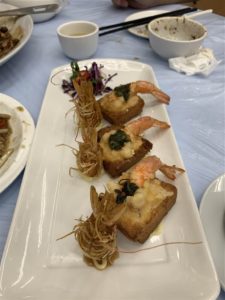
The Prawn Toast is James Li’s own innovation
Chef Tong Li has passed the baton to his son in overseeing Big Brother Biu’s Seafood Restaurant. His spirit of perseverance, persistence, ingenuity and faith shall remain as the epitome of Hong Kong’s Lion Rock Spirit.
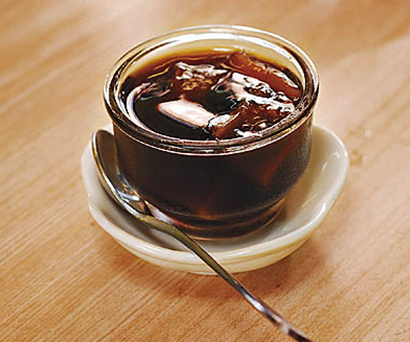
Photo: This is Vinegar and Ginger with Deer Tendon, an Award-Winning Dish at Big Brother Biu’s Seafood Restaurant.
Sources:
Interview with Chef Tong Li of Brother Biu’s Restaurant.
Interview with Chun Biu Li and Cindy Li of Brother Biu’s Restaurant, The Gold-Plated Plaque, Metro Radio, 176th Session (in Chinese).
Tong Li, the Undefeated Playbook of a Chef (in Chinese) (2014).
